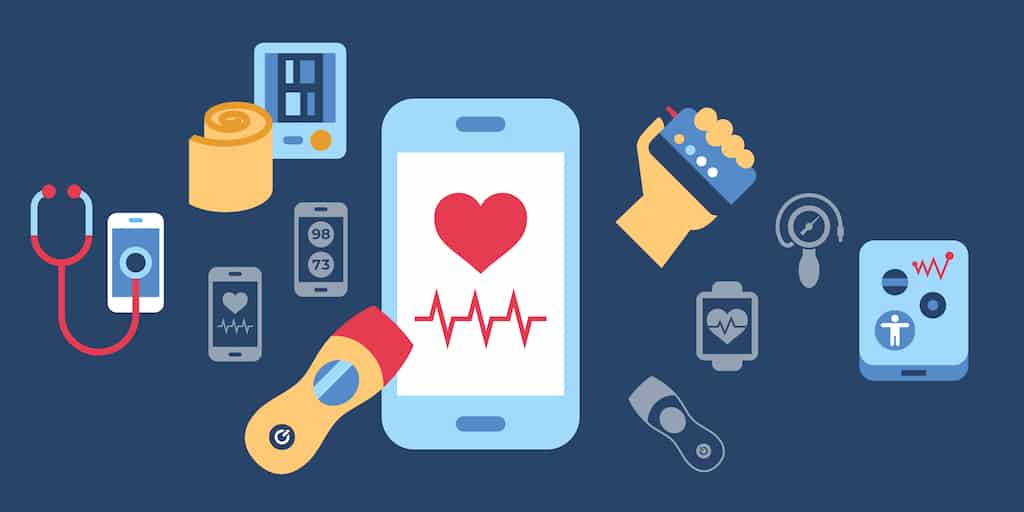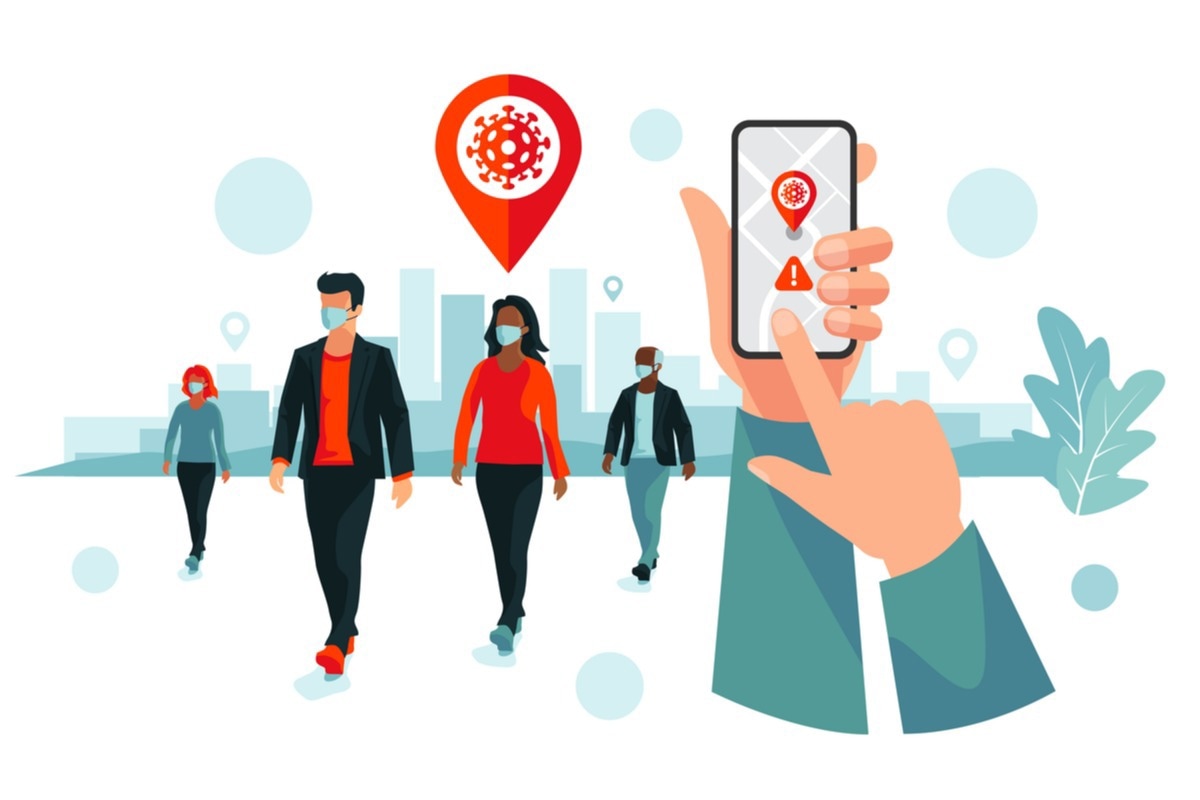Anúncios
Welcome to the digital age of medicine where healthcare applications are revolutionizing the way we approach health and wellness. This post will delve into how these innovative tools are reshaping the future of medicine. In an era where smartphones have become an extension of ourselves, it is only fitting that they also become a part of our healthcare routine. This discussion will explore how medical applications are not only making healthcare more accessible but also improving patient outcomes and transforming the dynamics of the doctor-patient relationship. Imagine having medical advice, reminders for medication, fitness tracking, and more, all at your fingertips. This is no longer a thing of the future but the reality of today. Throughout this discussion, we’ll be examining the impact of these healthcare apps on our lives and how they are changing the future of medicine. We’ll be shedding light on the most innovative healthcare apps that are currently on the market and how they are changing the face of medicine. From remote monitoring to telemedicine, these apps are providing solutions to some of the most significant healthcare challenges of our time. So, get ready to dive into a world where technology and healthcare are seamlessly intertwined, delivering a more efficient, convenient, and personalized approach to medicine. This is just the beginning of a medical revolution, the impact of which we are only beginning to understand. Join us as we explore the fascinating world of healthcare apps and their transformative power in medicine’s future.
The Advent of Healthcare Apps
The digital revolution has brought about radical changes in numerous industries, and healthcare is no exception. Among the most transformative innovations is the emergence and rapid adoption of mobile health applications, commonly referred to as mHealth apps. These applications have surged in popularity over the past decade, driven by the global proliferation of smartphones and increasing demand for on-demand, accessible healthcare services.
Anúncios

At their core, healthcare apps are designed to bridge the gap between patients and healthcare providers, offering convenient, real-time tools for monitoring, managing, and improving health. They enable users to take a proactive approach to their well-being by tracking vital signs, monitoring symptoms, managing medications, scheduling appointments, and even accessing medical records at the touch of a button. The potential of these apps to democratize healthcare access is profound, especially in underserved or rural regions where medical facilities may be limited.
Anúncios
One of the most significant advantages of healthcare apps is their ability to deliver remote care. With mHealth solutions, individuals no longer need to rely solely on in-person doctor visits to manage chronic conditions. Instead, these apps provide ongoing feedback and insights based on user-input data or integrated wearable device sensors. For example, someone managing diabetes can monitor their blood glucose levels, receive alerts for abnormal readings, and get dietary or medication advice without ever stepping foot in a clinic.
The functionality of these apps extends far beyond chronic disease management. From mental health support apps that provide guided meditations and cognitive behavioral therapy (CBT) tools, to fertility tracking apps and medication reminder systems, the diversity of offerings reflects the evolving needs of today’s health-conscious population. Many of these apps are developed in collaboration with healthcare professionals, ensuring that users receive credible, evidence-based guidance.
Furthermore, the integration of telehealth capabilities has redefined how and when patients interact with healthcare professionals. Through telemedicine-enabled apps, patients can consult doctors virtually via video calls, exchange messages, share lab results, and even receive prescriptions — all from the comfort of their home. This is particularly beneficial for individuals with mobility challenges, busy schedules, or those living in remote areas.
Another critical benefit is the enhancement of patient engagement and self-management. By empowering individuals with data about their health, apps foster a sense of ownership and accountability. This increased awareness often leads to healthier lifestyle choices, improved adherence to treatment plans, and ultimately better clinical outcomes.
The Role of Artificial Intelligence (AI) and Machine Learning (ML) in Healthcare Apps
The technological evolution of healthcare apps has been further accelerated by the integration of Artificial Intelligence (AI) and Machine Learning (ML). These sophisticated technologies are transforming static health tools into dynamic, intelligent systems capable of delivering personalized, predictive, and highly responsive care experiences.
AI and ML bring unparalleled efficiency in processing massive volumes of health data. By analyzing patterns in a user’s health metrics — such as heart rate trends, sleep cycles, or dietary habits — machine learning algorithms can identify early warning signs, recommend preventative measures, or flag concerning deviations that may require medical attention. This level of real-time insight was previously unimaginable without the aid of advanced computational tools.
In the realm of diagnostics, AI-powered apps are pushing the boundaries of what mobile technology can achieve. Dermatology apps, for instance, can analyze photos of skin conditions to detect possible issues such as melanoma or eczema. Similarly, ophthalmology-focused apps use AI to assess eye health through scans and imaging. These innovations are reducing wait times for diagnosis, lowering costs, and expanding the reach of specialized care.
Personalized medicine is another frontier being explored through AI integration. By learning from individual user profiles — which may include age, genetics, lifestyle, and existing medical conditions — AI algorithms can tailor health advice, dietary recommendations, and treatment plans to suit each person’s unique needs. For example, fitness and nutrition apps can curate exercise routines or meal plans that align with the user’s health goals and physical capabilities.
Mental health applications are also benefiting greatly from AI and ML. Chatbots embedded within these apps can offer conversational support, mood tracking, and behavioral interventions in real time. Although not a substitute for professional therapy, these tools provide timely assistance and reduce the stigma associated with seeking help.
Another compelling application of ML in healthcare is predictive analytics. By analyzing historical health data and current trends, ML models can forecast potential health risks, such as the likelihood of a heart attack or stroke, enabling preemptive care. This shift from reactive to proactive healthcare represents a monumental step forward in medical practice.
However, the effectiveness of AI and ML in healthcare apps depends on the quality and diversity of the data being used. Biased, incomplete, or non-representative data can lead to inaccurate predictions or reinforce health disparities. To counter this, developers are increasingly adopting inclusive data sets and involving multidisciplinary teams — including medical professionals, data scientists, and ethicists — in the app development process.
Ultimately, the synergy between mHealth applications and artificial intelligence is laying the foundation for a more responsive, personalized, and efficient healthcare system. As these technologies continue to mature, we can anticipate a future where our smartphones not only serve as communication devices but as intelligent, life-enhancing health companions.
Security and Privacy Concerns
While healthcare apps offer numerous benefits, they also raise several concerns regarding data privacy and security. These apps handle sensitive health data, which can be a prime target for cyber-attacks. Therefore, it is crucial for app developers to prioritize data security and comply with relevant regulations to protect user privacy. In addition, users must be informed about how their data is collected, used, and shared, and must be given control over their data. This is particularly important given the rise in the use of health data for research and commercial purposes.

Addressing the Challenges
To address these challenges, app developers can employ various strategies, such as implementing robust encryption protocols, conducting regular security audits, and developing clear privacy policies. In addition, regulatory bodies can play a vital role in establishing guidelines and standards for data privacy and security in mHealth apps. Moreover, user education can also be an effective strategy. Users should be made aware of the potential risks and benefits of using healthcare apps and should be equipped with the knowledge and tools to protect their data.
Future Prospects of Healthcare Apps
The future of healthcare apps looks promising. With the advent of advanced technologies like AI, ML, and blockchain, the scope and capabilities of these apps are expected to expand significantly. For instance, blockchain technology can enhance data security and transparency in healthcare apps, while AI and ML can facilitate personalized care and early disease detection. Furthermore, the integration of healthcare apps with other technologies such as wearable devices and Internet of Things (IoT) can provide even more comprehensive health monitoring and management.
Integration with Wearable and IoT Devices
Wearable devices and IoT have the potential to transform healthcare delivery by providing continuous, real-time health monitoring. These devices can collect a wealth of health data, such as heart rate, sleep patterns, and physical activity, which can be analyzed by healthcare apps to provide insights and recommendations. In addition, IoT devices can be used in home care settings to monitor patients and alert healthcare providers in case of emergencies, thereby improving patient safety and reducing hospital admissions.
Impact of COVID-19 on the Use of Healthcare Apps
The COVID-19 pandemic has underscored the importance of digital health solutions. With social distancing measures in place, the use of telemedicine apps has skyrocketed, providing a lifeline for patients and healthcare providers alike. Meanwhile, contact tracing apps have played a key role in controlling the spread of the virus. Moreover, the pandemic has highlighted the potential of healthcare apps in managing public health crises. These apps can provide real-time disease surveillance, facilitate remote patient monitoring and care, and support mental health services, among other benefits.

Remote Patient Monitoring and Care
Remote patient monitoring (RPM) apps have been instrumental in managing the healthcare crisis during the pandemic. These apps allow healthcare providers to monitor patients’ health remotely, reducing the need for hospital visits and freeing up healthcare resources. Moreover, RPM apps can facilitate the management of chronic diseases, which is particularly important given that individuals with chronic conditions are at a higher risk of severe illness from COVID-19. These apps can provide timely alerts and recommendations, helping patients to manage their conditions effectively and prevent complications.
Conclusion
In conclusion, healthcare apps are unequivocally transforming the landscape of modern medicine and redefining how we perceive and access healthcare. These digital tools are no longer optional add-ons but have become central to delivering effective, timely, and patient-centered care. From offering instant access to health records and virtual consultations to enabling self-monitoring of chronic conditions and promoting healthy habits, apps are enhancing patient engagement and streamlining clinical workflows like never before.
Their integration into everyday healthcare routines has not only improved the efficiency of medical practices but also fostered stronger connections between patients and healthcare providers. By empowering individuals with the ability to track and understand their health metrics, apps are cultivating a sense of ownership over one’s well-being. This shift is helping to close the gap between prevention and treatment, enabling a more proactive, rather than reactive, approach to healthcare.
Moreover, the growing infusion of cutting-edge technologies like Artificial Intelligence (AI), Machine Learning (ML), and predictive analytics is accelerating the evolution of these apps. With AI-driven algorithms capable of identifying early warning signs, suggesting treatments, or even predicting potential illnesses based on user data, the level of personalization in medicine is reaching unprecedented heights. These advancements hold the promise of more accurate diagnoses, early interventions, and tailor-made treatment plans that cater to the unique needs of each patient.
However, as with any technological leap, this transformation must be handled with careful consideration and responsibility. Ensuring the privacy and security of sensitive health data is paramount. Developers and healthcare providers must remain vigilant, adhering to strict data protection standards and maintaining transparency with users regarding how their information is collected, stored, and utilized. Equally important is the need for digital health literacy among users to maximize the benefits of these tools while understanding their limitations.
Looking ahead, the future of medicine is undoubtedly digital, and mobile health applications are at the forefront of this revolution. As innovation continues, we can expect even more sophisticated, integrated, and user-friendly solutions that not only support clinical care but also promote wellness in daily life. Healthcare apps symbolize a beacon of progress—bringing medicine to our fingertips, enhancing accessibility across socio-economic barriers, and promising a smarter, more connected, and inclusive future for global healthcare. The path forward is not just about technology, but about transforming lives through empowered care.

